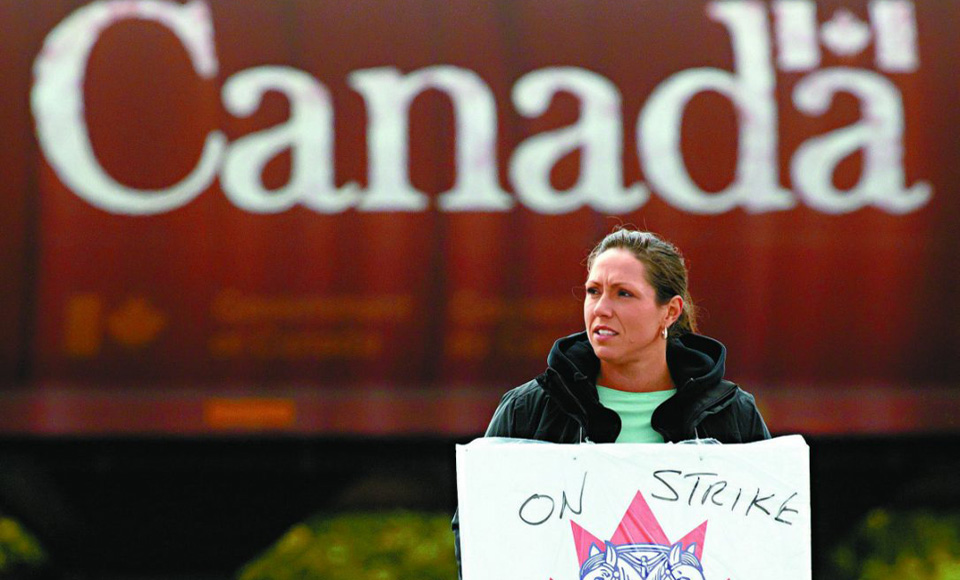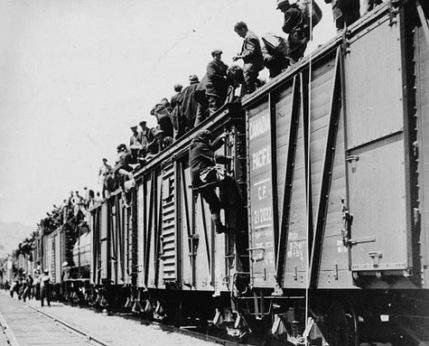
For American liberals, Canada is often looked to with a bit of jealousy. It is sometimes lauded by those on the center-left as a model for the type of society they wish existed in the U.S.: Civilized politics, multiculturalism as official public policy, a government that is pro-immigrant and pro-LGBTQ, and of course you can’t forget the universal healthcare.
The modern and progressive image that Canadian Prime Minister Justin Trudeau presents—appointing a cabinet that is 50 percent women, marching in Pride parades, and welcoming Syrian refugees as they arrive at the Toronto airport—certainly makes for a sharp contrast with the current occupant of the White House.
On July 1, Canada will celebrate its 150th birthday, and the government is throwing a big bash in cities and towns across the country. Though it won’t be marketed as such, what’s being commemorated is a series of meetings a century-and-a-half ago in which the political representatives of the railroad, agricultural, financial, and emerging manufacturing industries set aside their sectoral interests in favor of their more general interest as capitalists: They needed a single national market to more efficiently exploit Canada’s vast natural resources and compromised in order to achieve it.
It was once said that, “The executive of the modern state is but a committee for managing the common affairs of the whole bourgeoisie.” Canada’s official founding represented just such a state of affairs.
The noted historian Stanley Ryerson, whose 1968 book Unequal Union remains the classic Marxist text on the event, said the unification of the colonies of British North America into the Dominion of Canada was a result of the growing native capitalist classes’ aspiration to nationhood combined with the desire of Britain to strengthen its empire at a time when the Union Army in the U.S. was fresh off its Civil War victory.
The country that emerged in 1867 was “unequal,” as Ryerson argued, in the double sense that local capitalists were still reliant on London to greenlight their plans and because the presence of a distinct French Canadian nation prevented the formation of a fully English-dominated state (though not for lack of effort on the part of Anglo-Canadian elites). It’s a tension that still exists today between Quebec and the R.O.C. (rest of Canada).
But French Canadians weren’t the only ones who got the short end of the stick. An even worse hand was dealt to the Aboriginal peoples who inhabited the land that became Canada—the First Nations, Inuit, and Métis. As a co-op coffee shop in Grand Prés, Nova Scotia reminded patrons last week, the land that is now Canada was occupied long before 1867. It put up a billboard that reads, “Canada 150. Mi’kma’ki 13,000,” in reference to the traditional territory of the Mi’kmaq people which covers the area.

While their pre-Confederation relationship with European colonizers was comparatively less violent than that forced on indigenous peoples in the territories that became the United States, they still faced the stealing of their land and exile to remote reservations.
In the new Canada, these were complemented by cultural erasure, the stealing of their children who were packed off to residential schools designed to “kill the Indian in them,” and a total lack of consultation concerning how natural resources should be developed.
Though more recent governments have made efforts (some better, some worse) to address these past injustices, the tradition of neglect is still all too real. Poverty, lack of economic investment, high suicide rates, hundreds of missing and murdered women, and fights over resource extraction remain the hallmarks of the relationship between the indigenous peoples of northern North America and the Government of Canada.
From the imperial past to the (post-)colonial present, major historical abuses and ongoing social policy failures cast a pall on the celebratory atmosphere of “Canada 150,” the government’s official branding for the sesquicentennial.
Radical struggle for change
But there is another tradition in Canadian history perhaps more deserving of commemoration than the compromise of capitalists reached 150 years ago: The radical tradition of struggling for social change.
2017 also marks the 180th anniversary of the Mackenzie and Papineau Rebellions of 1837, a pair of joint uprisings against British domination that rocked the Crown’s North American possessions. In Toronto, reformer William Lyon Mackenzie forced the issue of constitutional republican democracy onto the agenda of the colonial administration, while in Montreal, Louis-Joseph Papineau led a fight for French Canadian self-determination against unelected British imperial rulers.
Executions and exiles followed for a number of those who fought in those rebellions, but many of their demands for democratic reform would eventually win out. A short-lived “Republic of Canada” on Navy Island near Buffalo, New York, and direct legislative elections were Mackenzie’s legacy; for Papineau, it was greater respect for language rights and self-government for French Canada.
Exactly a hundred years later, in 1937, the Canadian volunteers who went to fight fascism in the Spanish Civil War revived the memory of those earlier battles and marched under a banner bearing the name “Mackenzie-Papineau Battalion.”
That tradition of struggling for progressive and democratic reform not only persevered; it came to be a defining element of Canada in the decades that would follow.
It was alive in the Winnipeg General Strike of 1919 when workers walked off the job for the right to join the “One Big Union.” It was the animating spirit behind the “On-to-Ottawa Trek” during the Great Depression, when jobless workers hit the rails and highways toward the capital city to demand jobs and unemployment insurance. And it sustained the long fight for Medicare for All—from the early proposals by activists like Dr. Norman Bethune of Canada’s Communist Party on up to Tommy Douglas and the social democratic government of Saskatchewan which made the first steps toward single-payer healthcare in 1947.

It lives on today in the Quebec student movement against austerity, in the No One Is Illegal immigrant rights struggle, in the fight of land and water protectors resisting the destruction of the Earth by big energy companies.
And it is the same progressive tradition that requires the Trudeau government this year to expand the traditional July 1st Canada Day schedule of events to include major public observances of National Aboriginal Day to honor the First Nations, Inuit, and Métis peoples; Saint-Jean-Baptiste Day to recognize Francophone culture; and Canadian Multiculturalism Day to celebrate the contributions of the hundreds of cultures and nationalities that make up modern-day Canada.
So although the official observation of Canada’s founding remains centered on the date 150 years ago when a group of big business elites got together to set up a national market for themselves, there are many other proud episodes of popular struggle and democratic advance.
Those moments define a Canada worthy of celebration.
Later this week, People’s World will also publish a Canada 150 reflection by the Communist Party of Canada.












Comments